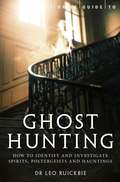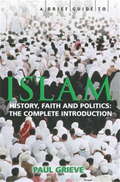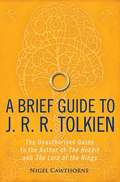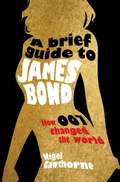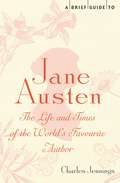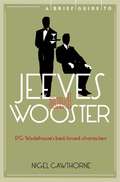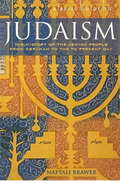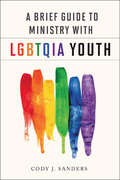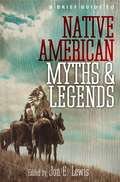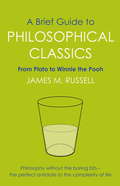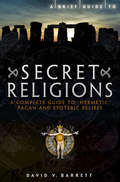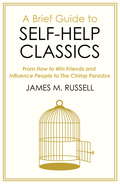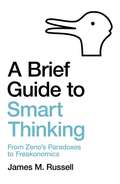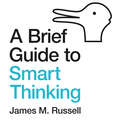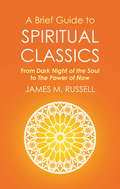- Table View
- List View
A Brief Guide to Ghost Hunting: How to Investigate Paranormal Activity from Spirits and Hauntings to Poltergeists (Brief Histories)
by Leo RuickbieThere has been an upsurge in books, television programmes, films and websites exploring the reality or otherwise of the spirit world. Not since the founding of The Ghost Club in 1862 and the Society for Psychical Research in 1882 has ghost hunting been so popular. Television and the internet, in particular, have fueled this new level of interest, creating a modern media phenomenon that spans the globe. But while the demand for information is high, good information remains scarce. A Brief Guide to Ghost Hunting leads us through the process of ghost hunting, from initially weighing the first report, to choosing equipment, and investigating and identifying the phenomena, with an analysis of the best places to go looking, methods of contacting the spirit world, how to explain paranormal activity and, crucially, how to survive the encounter. However, it is also a book about ghost hunting itself, drawing on 130 years of research in the cavernous archives of the Society for Psychical Research and even older history to find the earliest ghost stories. A Ghost Hunting Survey makes use of interviews with those billing themselves as ghost hunters to find out their views, motivations and experiences. New and original research makes use of statistics to map the nebulous world of apparitions while a Preliminary Survey of Hauntings offers an analysis of 923 reported phenomena from 263 locations across the UK.This is, as far as possible, an objective presentation of ghosts and ghost hunting. It is no wonder that mainstream science largely refuses to deal with the subject: it is too complicated. Without trying to convince you of any viewpoint, this book is intended to help you understand more.
A Brief Guide to Islam: History, Faith and Politics: The Complete Introduction (Brief Histories)
by Paul GrieveExploring the beliefs, history and politics of the ordinary people of Muslim countries, Grieve cuts through the complexities as he examines all aspects of Islam. He also addresses the big issues: can Islam support true democracy? Is true democracy what the West really wants for Muslim countries or are we merely seeking a cover of legitimacy for a policy of 'might is right'?Paul Grieve is an unbeliever - he is not a born-again Muslim, a proselytizer or a frustrated desert romantic. His aim is to inform. The result is an accessible but never simplistic guide that challengesstereotypical views, from women and banking to war and Malcolm X. Complete with advice for visitors to Muslim countries, and with carefully chosen primary sources, maps and illustrations, this is the ideal summary for the reader looking for an unbiased overview of the religious and political world issues that have become part of our everyday lives.
A Brief Guide to Islam: The Complete Introduction
by Paul GrieveExploring the beliefs, history and politics of the ordinary people of Muslim countries, Grieve cuts through the complexities as he examines all aspects of Islam. He also addresses the big issues: can Islam support true democracy? Is true democracy what the West really wants for Muslim countries or are we merely seeking a cover of legitimacy for a policy of 'might is right'?Paul Grieve is an unbeliever - he is not a born-again Muslim, a proselytizer or a frustrated desert romantic. His aim is to inform. The result is an accessible but never simplistic guide that challengesstereotypical views, from women and banking to war and Malcolm X. Complete with advice for visitors to Muslim countries, and with carefully chosen primary sources, maps and illustrations, this is the ideal summary for the reader looking for an unbiased overview of the religious and political world issues that have become part of our everyday lives.
A Brief Guide to J. R. R. Tolkien: A Comprehensive Introduction To The Author Of The Hobbit And The Lord Of The Rings (Brief Histories )
by Nigel CawthorneA very readable overview of Tolkien and his work, incorporating a brief biography, an examination of the books and a look at the process of filming his work, including The Hobbit and The Lord of the Rings saga. It explores how Tolkien's background as a medievalist and linguist informed the languages of Middle-earth, the influence of his Catholicism and Tolkien's legacy in fantasy.A timely book to coincide with the first of Peter Jackson's two keenly awaited Hobbit films.
A Brief Guide to J. R. R. Tolkien: A comprehensive introduction to the author of The Hobbit and The Lord of the Rings (Brief Histories)
by Nigel CawthorneA very readable overview of Tolkien and his work, incorporating a brief biography, an examination of the books and a look at the process of filming his work, including The Hobbit and The Lord of the Rings saga. It explores how Tolkien's background as a medievalist and linguist informed the languages of Middle-earth, the influence of his Catholicism and Tolkien's legacy in fantasy.A timely book to coincide with the first of Peter Jackson's two keenly awaited Hobbit films.
A Brief Guide to James Bond
by Nigel CawthorneThe world's fascination with Bond is unstoppable. James Bond is the greatest British fictional hero of the post-war era. He also has a huge following in the US - and around the world - as a legendary Cold War warrior, and now as a daredevil able to take on the villains of the post-Cold War world. The Bond books are all in print. Today, Sebastian Faulks is writing new stories while Charlie Higson is writing children's versions.In this comprehensive guide to Ian Fleming, the books, the films and the world that was created out of 007, Nigel Cawthorne uncovers Bond's allure. It comes with special sections on the main characters - Q, M, the Bond Girls, and the women who first inspired them; the cars, and the incomparable baddies. It will be the ideal gift for fans and aficionados alike and will be published to coincide with the 50th anniversary of DOCTOR NO; the new film is scheduled for autumn 2012.
A Brief Guide to Jane Austen: The Life And Times Of The World's Favourite Author
by Charles JenningsJane Austen is a mystery. The first incontrovertibly great woman novelist, she is, among other things, one of the finest prose stylists in literature; the first truly modern writer, the Godmother of chick lit. She is also the greatest enigma (next to Shakespeare) in English literature. Soldiers in the First World War sat in the trenches and read them for the civilising comforts they provided. Hard-nut literary critics such as F. R. Leavis lauded their austere complexity. World Book Day, 2007, found that Pride and Prejudice was the one book 'The nation can't live without'.In this witty, accessible guide, Charles Jennings goes in search of this enigma through her words as well as her times, including a short biography, an overview of the novels, as well as the world that she inhabited. Finally, the book contains Jane's very own words of advice for the modern life.
A Brief Guide to Jane Austen: The Life and Times of the World's Favourite Author (Brief Histories)
by Charles JenningsJane Austen is a mystery. The first incontrovertibly great woman novelist, she is, among other things, one of the finest prose stylists in literature; the first truly modern writer, the Godmother of chick lit. She is also the greatest enigma (next to Shakespeare) in English literature. Soldiers in the First World War sat in the trenches and read them for the civilising comforts they provided. Hard-nut literary critics such as F. R. Leavis lauded their austere complexity. World Book Day, 2007, found that Pride and Prejudice was the one book 'The nation can't live without'.In this witty, accessible guide, Charles Jennings goes in search of this enigma through her words as well as her times, including a short biography, an overview of the novels, as well as the world that she inhabited. Finally, the book contains Jane's very own words of advice for the modern life.
A Brief Guide to Jeeves and Wooster (Brief Histories )
by Nigel CawthorneA comprehensive guide to P. G. Wodehouse's two best-loved comic characters, Bertram Wilbeforce Wooster and his valet ('Reggie') Jeeves, Bertie's friends and relatives and their world of sunshine, country houses and champagne. Although the stories may seem quintessentially English, they were for the most part written in the United States by a man who spent more than half his adult life there, eventually becoming a citizen in 1955. The first stories involving the two characters are even set in New York, while those that aren't are set in an England that has never existed, contrived to appeal to an American audience. Cawthorne offers fascinating insights into Wodehouse's world, his life - on Long Island and elsewhere - the wonderful short stories and novels and the many adaptations for stage and screen.
A Brief Guide to Jeeves and Wooster (Brief Histories)
by Nigel CawthorneA comprehensive guide to P. G. Wodehouse's two best-loved comic characters, Bertram Wilbeforce Wooster and his valet ('Reggie') Jeeves, Bertie's friends and relatives and their world of sunshine, country houses and champagne. Although the stories may seem quintessentially English, they were for the most part written in the United States by a man who spent more than half his adult life there, eventually becoming a citizen in 1955. The first stories involving the two characters are even set in New York, while those that aren't are set in an England that has never existed, contrived to appeal to an American audience. Cawthorne offers fascinating insights into Wodehouse's world, his life - on Long Island and elsewhere - the wonderful short stories and novels and the many adaptations for stage and screen.
A Brief Guide to Judaism: Theology, History and Practice
by Naftali BrawerThe Jewish religion is one of the major faiths of the world yet one of the least understood. In a wide-ranging and accessible guide for the general reader Rabbi Naftali Brawer outlines the major themes and history of over 5,000 years of Jewish faith from its Abrahamic origins and the foundations of Jerusalem to the eras of exile, diaspora, and persecution. From ritual and practise to faith and politics, the theology and history of Judaism are bound together.Brawer argues that Judaism is poised between heaven and earth. On the one hand it calls on its adherents to transcend the material world through ritual and prayer: on the other hand Judaism positively celebrates joys of food, family and society. Through this seeming paradox, Brawer explores the nature and characteristics of faith - God and Man, Torah, Mitzvah, the Jewish People and the Land of Israel. He also shows how ritual and practise punctuate Jewish existence, from daily prayers to the rites of passage that chart a lifetime.
A Brief Guide to Judaism: Theology, History and Practice (Brief Histories)
by Naftali BrawerThe Jewish religion is one of the major faiths of the world yet one of the least understood. In a wide-ranging and accessible guide for the general reader Rabbi Naftali Brawer outlines the major themes and history of over 5,000 years of Jewish faith from its Abrahamic origins and the foundations of Jerusalem to the eras of exile, diaspora, and persecution. From ritual and practise to faith and politics, the theology and history of Judaism are bound together.Brawer argues that Judaism is poised between heaven and earth. On the one hand it calls on its adherents to transcend the material world through ritual and prayer: on the other hand Judaism positively celebrates joys of food, family and society. Through this seeming paradox, Brawer explores the nature and characteristics of faith - God and Man, Torah, Mitzvah, the Jewish People and the Land of Israel. He also shows how ritual and practise punctuate Jewish existence, from daily prayers to the rites of passage that chart a lifetime.
A Brief Guide to Ministry with LGBTQIA Youth
by Cody J. SandersDespite our best efforts to create welcoming and affirming congregations, the reality is that church can still be a harmful place to LGBTQIA youth. <P><P>Inside A Brief Guide to Ministry with LGBTQIA Youth, author Cody J. Sanders challenges pastors and church leaders to reflect on the various trials that adolescence brings for LGBTQIA youth. Designed for congregations that currently have a theologically and biblically affirming stance toward the LGBTQIA community, this unique resource provides insight and practical advice for tough questions like: <P><P><ul> <li>How does an affirming stance toward LGBTQIA people affect the day-to-day experience of teenagers in a church setting? </li> <li>In what ways can a church's youth ministry have a positive impact on the lives of LGBTQIA youth who want to fully live out their Christian faith and their gender identity? </li> <li>How can a pastor, youth minister, or youth ministry volunteer embrace, nurture, and provide skillful care for LGBTQIA youth in a congregation or community?</li></ul> <P><P>A glossary of terms to use when talking about LGBTQIA issues and a list of national and location resources that can be used to support LGBTQIA youth are included.
A Brief Guide to Native American Myths and Legends: With a new introduction and commentary by Jon E. Lewis
by Lewis SpenceIn this brilliant reworking of Lewis Spence's seminal Myths and Legends of the North American Indians, Jon E. Lewis puts the work in context with an extensive new introductory essay and additional commentary throughout the book on the history of Native Americans, their language and lifestyle, culture and religion/mythology. He includes examples of myths from tribes omitted by Spence, a guide to tribes and their myths by region, a basic Lakota (Sioux) glossary, guides to key pronunciations and a bibliography.
A Brief Guide to Native American Myths and Legends: With a new introduction and commentary by Jon E. Lewis (Brief Histories)
by Lewis SpenceIn this brilliant reworking of Lewis Spence's seminal Myths and Legends of the North American Indians, Jon E. Lewis puts the work in context with an extensive new introductory essay and additional commentary throughout the book on the history of Native Americans, their language and lifestyle, culture and religion/mythology. He includes examples of myths from tribes omitted by Spence, a guide to tribes and their myths by region, a basic Lakota (Sioux) glossary, guides to key pronunciations and a bibliography.
A Brief Guide to Philosophical Classics: From Plato to Winnie the Pooh (Brief Histories)
by James M. RussellBig ideas sometimes come from the strangest places. In this wide ranging introduction, James M Russell takes the fear out of philosophy and selects seventy-six works - from Plato, Descartes and Wittgenstein to Philip K Dick and the Moomins as well as contemporary thinkers such as Peter Singer and John Rawls. Dividing into accessible sections - history, contemplation, happiness, and -isms, Russell gives us the lives as well as the lessons of the great thinkers, including a digest of their key ideas. A perfect antidote to the complex life.The topics and books covered include:Traditional Philosophy:The Republic, Plato; The Confessions, St Augustine; The Leviathan, Thomas Hobbes; On Liberty, John Stuart Mill; Philisophical Investigations, Ludwig Wittgenstein; Critique of Pure Reason, Immanuel Kant.Outsiders:Fear and Trembling, Soren Kierkegaard; Beyond Good and Evil, Frederick Nietzsche; The Outsider, Albert Camus; Doors of Perception, Aldous Huxley.Contemplation as Philosophy:The Prophet, Kahil Gibran; Jonathan Livingston Seagull, Richard Bach; Zen and the Art of Motorcycle Maintenance, Robert Pirsig; The Tao of Pooh, Benjamin Hoff.The Continental Tradition:The Prison Notebooks, Antonio Gramsci; The History of Sexuality, Michel Foucault; Symbolic Exchange and Death, Jean Baudrillard.How to Live Your Life:The Art of War, Sun Tzu; Maxims, La Rouchefoucauld; Memories, Dreams, Reflections, Carl Jung; On Sexuality, Sigmund Freud; On Becoming a Person, Carl Rogers.Political and Personal Issues:Das Kapital, Karl Marx; Being and Nothingness, Jean Paul Sartre; Gaia, James Lovelock.Modern Philosophy:A Theory of Justice, John Rawls; Darwin's Dangerous Idea, Daniel Dennett; After the Terror, Ted Honderich.
A Brief Guide to Philosophical Classics: The Thinking Person's Guide To The Great Books Of Philosophy
by James M. RussellBig ideas sometimes come from the strangest places. In this wide ranging introduction, James M Russell takes the fear out of philosophy and selects seventy-six works - from Plato, Descartes and Wittgenstein to Philip K Dick and the Moomins as well as contemporary thinkers such as Peter Singer and John Rawls. Dividing into accessible sections - history, contemplation, happiness, and -isms, Russell gives us the lives as well as the lessons of the great thinkers, including a digest of their key ideas. A perfect antidote to the complex life.The topics and books covered include:Traditional Philosophy:The Republic, Plato; The Confessions, St Augustine; The Leviathan, Thomas Hobbes; On Liberty, John Stuart Mill; Philisophical Investigations, Ludwig Wittgenstein; Critique of Pure Reason, Immanuel Kant.Outsiders:Fear and Trembling, Soren Kierkegaard; Beyond Good and Evil, Frederick Nietzsche; The Outsider, Albert Camus; Doors of Perception, Aldous Huxley.Contemplation as Philosophy:The Prophet, Kahil Gibran; Jonathan Livingston Seagull, Richard Bach; Zen and the Art of Motorcycle Maintenance, Robert Pirsig; The Tao of Pooh, Benjamin Hoff.The Continental Tradition:The Prison Notebooks, Antonio Gramsci; The History of Sexuality, Michel Foucault; Symbolic Exchange and Death, Jean Baudrillard.How to Live Your Life:The Art of War, Sun Tzu; Maxims, La Rouchefoucauld; Memories, Dreams, Reflections, Carl Jung; On Sexuality, Sigmund Freud; On Becoming a Person, Carl Rogers.Political and Personal Issues:Das Kapital, Karl Marx; Being and Nothingness, Jean Paul Sartre; Gaia, James Lovelock.Modern Philosophy:A Theory of Justice, John Rawls; Darwin's Dangerous Idea, Daniel Dennett; After the Terror, Ted Honderich.
A Brief Guide to Secret Religions: A Complete Guide To Hermetic, Pagan And Esoteric Beliefs (Brief Histories )
by David V. BarrettThis wide-ranging book explores the diversity of esoteric and occult beliefs.Neo-Paganism is one of the fastest-growing new religions in the western world where witchcraft or Wicca, Druidry, and Urban Shamanism are thriving. Alongside this there has been an upsurge in New Age ideas of an even wider variety, including astrology, Tarot, numerology, and many others. And then there are members of various schools of occult science, practising High Magic.Why this new interest in old beliefs? Why are millions of educated people today abandoning both the established religion of their parents and 21st century scientific rationalism and turning to magic and esoteric teachings? In their search for spirituality those who follow these paths claim to be applying ancient wisdom to the modern world. The Brief History of Secret Religions, a companion book to The Brief History of Secret Societies, looks at the history and variety of these esoteric movements, where they came from and what they tell us about the world today.Praise for The New Believers:'an excellent guide to fringe religions that juxtaposes "respectable" movements and those conventionally dismissed as cults.' The Telegraph.'no-nonsense, comprehensive survey packed with non-judgmental information about the beliefs, aims and activities of such movements. Daily Mail.
A Brief Guide to Secret Religions: A Complete Guide to Hermetic, Pagan and Esoteric Beliefs (Brief Histories)
by David V. BarrettThis wide-ranging book explores the diversity of esoteric and occult beliefs.Neo-Paganism is one of the fastest-growing new religions in the western world where witchcraft or Wicca, Druidry, and Urban Shamanism are thriving. Alongside this there has been an upsurge in New Age ideas of an even wider variety, including astrology, Tarot, numerology, and many others. And then there are members of various schools of occult science, practising High Magic.Why this new interest in old beliefs? Why are millions of educated people today abandoning both the established religion of their parents and 21st century scientific rationalism and turning to magic and esoteric teachings? In their search for spirituality those who follow these paths claim to be applying ancient wisdom to the modern world. The Brief History of Secret Religions, a companion book to The Brief History of Secret Societies, looks at the history and variety of these esoteric movements, where they came from and what they tell us about the world today.Praise for The New Believers:'an excellent guide to fringe religions that juxtaposes "respectable" movements and those conventionally dismissed as cults.' The Telegraph.'no-nonsense, comprehensive survey packed with non-judgmental information about the beliefs, aims and activities of such movements. Daily Mail.
A Brief Guide to Self-Help Classics: From How to Win Friends and Influence People to The Chimp Paradox
by James M. RussellFrom Dale Carnegie's How to Win Friends and Influence People, published in 1936, which has sold over 30 million copies to date, to the mind management programme of Professor Steve Peters' The Chimp Paradox, a concise and insightful guide to seventy of the most influential self-help books ever published An entertaining, accessible companion, for readers of self-help books and sceptics alike. The titles include classics on achieving success, confidence and happiness, mindfulness, how to change your life, self-control, overcoming anxiety and self-esteem issues and stress relief. The chronological arrangement of the titles reveals the intriguing story of how early self-improvement titles were succeeded by increasingly personality-based, materialistic titles and shows how breakout classics often influenced other titles for decades to come. Each book is summarised to convey a brief idea of what it has to offer the interested reader, while a 'Speed Read' for each book delivers a quick sense of what each writer is like to read and a highly compressed summary of the main points of the book in question. This is a work of reference to dip into, that acknowledges that some of the most powerful insights into ourselves can be found in texts that aren't perceived as being 'self-help' books, and that wisdom and consolation can be found in the strangest places.
A Brief Guide to Smart Thinking: From Zeno's Paradoxes to Freakonomics
by James M. RussellEach book is summarised to convey a brief idea of what each one has to offer the interested reader, while a 'Speed Read' for each book delivers a quick sense of what each book is like to read and a highly compressed summary of the main points of the book in question. The titles covered include thought-provoking classics on psychology, mindfulness, rationality, the brain, mathematical and economic thought and practical philosophy. The selection includes books about self-improvement as well as historically interesting accounts of how the mind works. Titles included go back as far as the Epictetus classic TheEnchiridion and Bertrand Russell's charming TheABC of Relativity, and proceed through classics such as Edward de Bono's Lateral Thinking and into the digital era with titles such as The Shallows and Big Data. The books are arranged chronologically, which draws attention to some of the interesting juxtapositions and connections between them. Some of the titles included are: Freakonomics, by Steven D. Levitt; Blink: The Power of Thinking Without Thinking, by Malcolm Gladwell; Sapiens: A Brief History of Humankind, by Yuval Noah Harari; The Organized Mind: Thinking Straight in the Age of Information Overload, by Daniel J. Levitin; The Descent of Man, by Grayson Perry; How the Mind Works, by Steven Pinker; Black Box Thinking: Why Some People Never Learn from Their Mistakes - But Some Do, by Matthew Syed; We Should All Be Feminists, by Chimamanda Ngozi Adichie; Guns, Germs, and Steel: The Fates of Human Societies, by Jared Diamond; The Black Swan: The Impact of the Highly Improbable, by Nassim Nicholas Taleb; Man's Search for Meaning, by Viktor E. Frankl; The News: A User's Manual, by Alain de Botton; Mindware: Tools for Smart Thinking, by Richard E. Nisbett; The ABC of Relativity, by Bertrand Russell; The Psychopath Test, by Jon Ronson; The Path: What Chinese Philosophers Can Teach Us About the Good Life, by Michael Puett; A Brief History of Time, by Stephen Hawking; Messy: The Power of Disorder to Transform Our Lives, by Tim Harford; Big Data: A Revolution That Will Transform How We Live, Work, and Think, by Viktor Mayer-Schönberger; Moneyball: The Art of Winning an Unfair Game, by Michael Lewis; The Survivors Club: The Secrets and Science That Could Save Your Life, by Ben Sherwood; Black Box Thinking, by Matthew Syed; Chaos: Making a New Science, by James Gleick; A Short History of Nearly Everything, by Bill Bryson; The Shallows: What the Internet Is Doing to Our Brains, by Nicholas Carr; Making Ideas Happen: Overcoming the Obstacles Between Vision and Reality, by Scott Belsky; The Enchiridion, by Epictetus; Gödel, Escher, Bach, by Douglas R. Hofstadter; What I Talk About When I Talk About Running, by Haruki Murakami; and Lateral Thinking, by Edward de Bono.
A Brief Guide to Smart Thinking: From Zeno's Paradoxes to Freakonomics
by James M. RussellEach book is summarised to convey a brief idea of what each one has to offer the interested reader, while a 'Speed Read' for each book delivers a quick sense of what each book is like to read and a highly compressed summary of the main points of the book in question. The titles covered include thought-provoking classics on psychology, mindfulness, rationality, the brain, mathematical and economic thought and practical philosophy. The selection includes books about self-improvement as well as historically interesting accounts of how the mind works. Titles included go back as far as the Epictetus classic The Enchiridion and Bertrand Russell's charming The ABC of Relativity, and proceed through classics such as Edward de Bono's Lateral Thinking and into the digital era with titles such as The Shallows and Big Data. The books are arranged chronologically, which draws attention to some of the interesting juxtapositions and connections between them. Some of the titles included are: Freakonomics, by Steven D. Levitt; Blink: The Power of Thinking Without Thinking, by Malcolm Gladwell; Sapiens: A Brief History of Humankind, by Yuval Noah Harari; The Organized Mind: Thinking Straight in the Age of Information Overload, by Daniel J. Levitin; The Descent of Man, by Grayson Perry; How the Mind Works, by Steven Pinker; Black Box Thinking: Why Some People Never Learn from Their Mistakes - But Some Do, by Matthew Syed; We Should All Be Feminists, by Chimamanda Ngozi Adichie; Guns, Germs, and Steel: The Fates of Human Societies, by Jared Diamond; The Black Swan: The Impact of the Highly Improbable, by Nassim Nicholas Taleb; Man's Search for Meaning, by Viktor E. Frankl; The News: A User's Manual, by Alain de Botton; Mindware: Tools for Smart Thinking, by Richard E. Nisbett; The ABC of Relativity, by Bertrand Russell; The Psychopath Test, by Jon Ronson; The Path: What Chinese Philosophers Can Teach Us About the Good Life, by Michael Puett; A Brief History of Time, by Stephen Hawking; Messy: The Power of Disorder to Transform Our Lives, by Tim Harford; Big Data: A Revolution That Will Transform How We Live, Work, and Think, by Viktor Mayer-Schönberger; Moneyball: The Art of Winning an Unfair Game, by Michael Lewis; The Survivors Club: The Secrets and Science That Could Save Your Life, by Ben Sherwood; Black Box Thinking, by Matthew Syed; Chaos: Making a New Science, by James Gleick; A Short History of Nearly Everything, by Bill Bryson; The Shallows: What the Internet Is Doing to Our Brains, by Nicholas Carr; Making Ideas Happen: Overcoming the Obstacles Between Vision and Reality, by Scott Belsky; The Enchiridion, by Epictetus; Gödel, Escher, Bach, by Douglas R. Hofstadter; What I Talk About When I Talk About Running, by Haruki Murakami; and Lateral Thinking, by Edward de Bono.
A Brief Guide to Smart Thinking: From Zeno’s Paradoxes to Freakonomics
by James M. RussellEach book is summarised to convey a brief idea of what each one has to offer the interested reader, while a 'Speed Read' for each book delivers a quick sense of what each book is like to read and a highly compressed summary of the main points of the book in question. The titles covered include thought-provoking classics on psychology, mindfulness, rationality, the brain, mathematical and economic thought and practical philosophy. The selection includes books about self-improvement as well as historically interesting accounts of how the mind works. Titles included go back as far as the Epictetus classic The Enchiridion and Bertrand Russell's charming The ABC of Relativity, and proceed through classics such as Edward de Bono's Lateral Thinking and into the digital era with titles such as The Shallows and Big Data. The books are arranged chronologically, which draws attention to some of the interesting juxtapositions and connections between them. Some of the titles included are: Freakonomics, by Steven D. Levitt; Blink: The Power of Thinking Without Thinking, by Malcolm Gladwell; Sapiens: A Brief History of Humankind, by Yuval Noah Harari; The Organized Mind: Thinking Straight in the Age of Information Overload, by Daniel J. Levitin; The Descent of Man, by Grayson Perry; How the Mind Works, by Steven Pinker; Black Box Thinking: Why Some People Never Learn from Their Mistakes - But Some Do, by Matthew Syed; We Should All Be Feminists, by Chimamanda Ngozi Adichie; Guns, Germs, and Steel: The Fates of Human Societies, by Jared Diamond; The Black Swan: The Impact of the Highly Improbable, by Nassim Nicholas Taleb; Man's Search for Meaning, by Viktor E. Frankl; The News: A User's Manual, by Alain de Botton; Mindware: Tools for Smart Thinking, by Richard E. Nisbett; The ABC of Relativity, by Bertrand Russell; The Psychopath Test, by Jon Ronson; The Path: What Chinese Philosophers Can Teach Us About the Good Life, by Michael Puett; A Brief History of Time, by Stephen Hawking; Messy: The Power of Disorder to Transform Our Lives, by Tim Harford; Big Data: A Revolution That Will Transform How We Live, Work, and Think, by Viktor Mayer-Schönberger; Moneyball: The Art of Winning an Unfair Game, by Michael Lewis; The Survivors Club: The Secrets and Science That Could Save Your Life, by Ben Sherwood; Black Box Thinking, by Matthew Syed; Chaos: Making a New Science, by James Gleick; A Short History of Nearly Everything, by Bill Bryson; The Shallows: What the Internet Is Doing to Our Brains, by Nicholas Carr; Making Ideas Happen: Overcoming the Obstacles Between Vision and Reality, by Scott Belsky; The Enchiridion, by Epictetus; Gödel, Escher, Bach, by Douglas R. Hofstadter; What I Talk About When I Talk About Running, by Haruki Murakami; and Lateral Thinking, by Edward de Bono.
A Brief Guide to Spiritual Classics: From Dark Night of the Soul to The Power of Now
by James M. RussellThis very readable brief guide examines a wide range of spiritual writing that can be read for enjoyment or inspiration, including some books that come from beyond any religious tradition. While written from within the Christian tradition, and offering introductions to the writings of medieval mystics, Quakers and modern evangelists, both Protestant and Catholic, it also looks at classics of secular spirituality and writings from different religious traditions.Each book is explained to convey a brief idea of what each one has to offer the interested reader, while a 'Speed Read' for each book delivers a quick sense of what each writer is like to read and a highly compressed summary of the main points of the book in question.This is an excellent reference to dip into, but within sections such as Early Christian Classics, Secular Texts, Lives of Inspiration and Alternative Approaches, the books are arranged chronologically, revealing some interesting juxtapositions and connections between them.
A Brief Guide to Spiritual Classics: From Dark Night of the Soul to The Power of Now (Brief Histories)
by James M. RussellThis very readable brief guide examines a wide range of spiritual writing that can be read for enjoyment or inspiration, including some books that come from beyond any religious tradition. While written from within the Christian tradition, and offering introductions to the writings of medieval mystics, Quakers and modern evangelists, both Protestant and Catholic, it also looks at classics of secular spirituality and writings from different religious traditions.Each book is explained to convey a brief idea of what each one has to offer the interested reader, while a 'Speed Read' for each book delivers a quick sense of what each writer is like to read and a highly compressed summary of the main points of the book in question.This is an excellent reference to dip into, but within sections such as Early Christian Classics, Secular Texts, Lives of Inspiration and Alternative Approaches, the books are arranged chronologically, revealing some interesting juxtapositions and connections between them.
